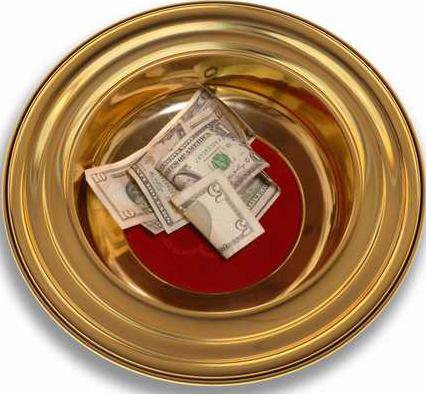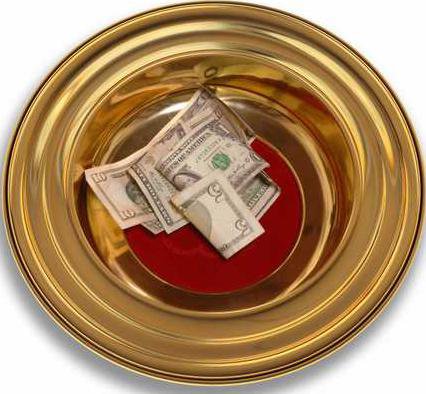Tithing has its rewards, but how much should you give? Should you give it all?
Did you hear about this church in Grapevine, Texas?
The church launched a 90-day challenge to its members, looking for them to bring their tithing to the church. But theres a catch.
If God doesnt fulfill his blessing, you get your money back.
Hashtag high reward.
This is actually a common practice by churches. The Fellowship Church launches these challenges every year, and churches in California and South Carolina have also been known to have a similar approach to try and get more people to start tithing.
Tithing actually presents a lot of benefits, according to the 2013 State of the Plate research project. The five-year study, which looked at about 4,000 people who donate 10 percent or more of their income each year to their religious institution or charities, found some top results for tithe-payers.
The study found that about 10 million people in the United States are tithe-payers who give more than $50 billion to religious and charitable causes, according to Christianity Today. But theres something more noteworthy for tithe-payers theyre better at managing money.
Tithers carry much less debt than most people and are financially better off than Christian non-tithers, Christianity Today reported. Eighty percent of tithers have no unpaid credit card bills; 74 percent have no car payments; 48 percent own their home; and 28% are completely debt-free.
And theyre giving more than 10 percent, according to the study. In fact, 77 percent give between 11 and 20 percent.
But how much you should give when tithing has been a rising debate among churchgoers. As Rachel Phan of The Huffington Post notes, some people were sacrificing much of their pay to help out their church and finding nothing but debt.
I didnt have a job, I was diagnosed as disabled and I was living on unemployment, Wes Prang, a Christian, told HuffPost. I had a monthly income of $339 a month, but I was tithing and I continued to tithe when my rent went up but my (check) did not.
But as Meagan Gillmore a self-proclaimed Jesus-following Baptist said to HuffPost, You need to be generous because God has given you something that doesnt just belong to you. You need to tithe.
Whether to tithe and how much connects back to the Old and New Testaments. Phan, for instance, noted that tithing is an Old Testament concept. The Grace Communion International Organization looked into the difference between the Old and New Testaments when it came to tipping and offering tithes. As the GCIO put it, its about putting your money "where your heart is."
You may remember back in February when an Applebees waitress didnt get a tip on her receipt. Rather, she read a statement written from her customer, who wrote, I give God 10 percent. Why do you get 18?
That was a reference to tithing. But did the customer take the wrong approach?
Are we putting our money where our heart is? We can tell where our heart is by seeing where we are putting our money, the GCI explained.
Where your treasure is, there your heart will be also, Jesus said.
Did you hear about this church in Grapevine, Texas?
The church launched a 90-day challenge to its members, looking for them to bring their tithing to the church. But theres a catch.
If God doesnt fulfill his blessing, you get your money back.
Hashtag high reward.
This is actually a common practice by churches. The Fellowship Church launches these challenges every year, and churches in California and South Carolina have also been known to have a similar approach to try and get more people to start tithing.
Tithing actually presents a lot of benefits, according to the 2013 State of the Plate research project. The five-year study, which looked at about 4,000 people who donate 10 percent or more of their income each year to their religious institution or charities, found some top results for tithe-payers.
The study found that about 10 million people in the United States are tithe-payers who give more than $50 billion to religious and charitable causes, according to Christianity Today. But theres something more noteworthy for tithe-payers theyre better at managing money.
Tithers carry much less debt than most people and are financially better off than Christian non-tithers, Christianity Today reported. Eighty percent of tithers have no unpaid credit card bills; 74 percent have no car payments; 48 percent own their home; and 28% are completely debt-free.
And theyre giving more than 10 percent, according to the study. In fact, 77 percent give between 11 and 20 percent.
But how much you should give when tithing has been a rising debate among churchgoers. As Rachel Phan of The Huffington Post notes, some people were sacrificing much of their pay to help out their church and finding nothing but debt.
I didnt have a job, I was diagnosed as disabled and I was living on unemployment, Wes Prang, a Christian, told HuffPost. I had a monthly income of $339 a month, but I was tithing and I continued to tithe when my rent went up but my (check) did not.
But as Meagan Gillmore a self-proclaimed Jesus-following Baptist said to HuffPost, You need to be generous because God has given you something that doesnt just belong to you. You need to tithe.
Whether to tithe and how much connects back to the Old and New Testaments. Phan, for instance, noted that tithing is an Old Testament concept. The Grace Communion International Organization looked into the difference between the Old and New Testaments when it came to tipping and offering tithes. As the GCIO put it, its about putting your money "where your heart is."
You may remember back in February when an Applebees waitress didnt get a tip on her receipt. Rather, she read a statement written from her customer, who wrote, I give God 10 percent. Why do you get 18?
That was a reference to tithing. But did the customer take the wrong approach?
Are we putting our money where our heart is? We can tell where our heart is by seeing where we are putting our money, the GCI explained.
Where your treasure is, there your heart will be also, Jesus said.

